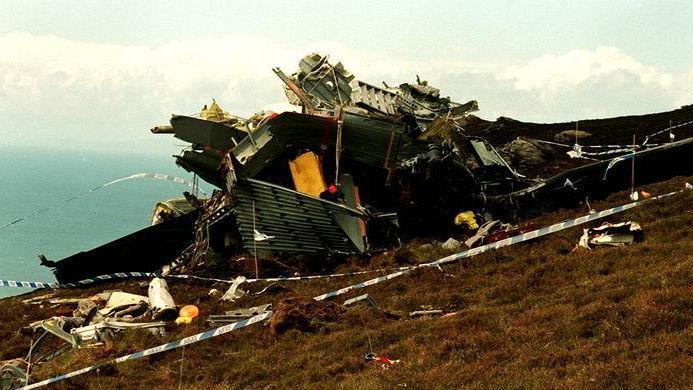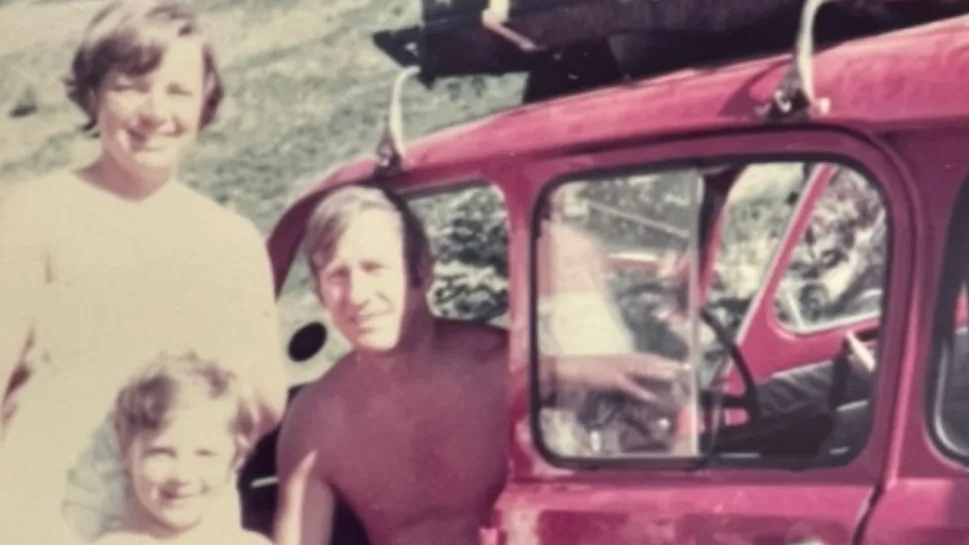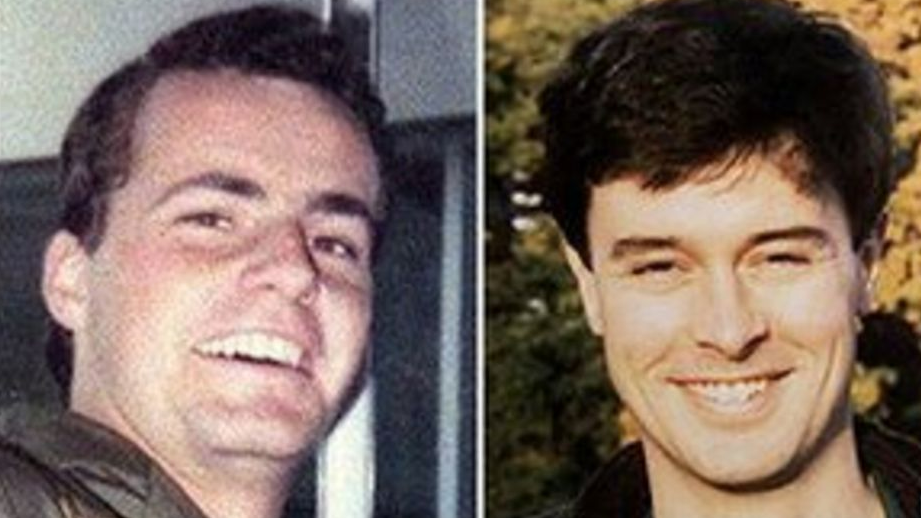RAF Chinook: Anger over lack of 30th anniversary memorial

All 29 people people on board RAF Chinook ZD576 died on 2 June 1994
- Published
Families of people killed in the RAF Chinook crash on the Mull of Kintyre say they have been “failed” by the Ministry of Defence who have not organsised a 30th anniversary memorial.
Four crew and 25 passengers were killed when the helicopter went down in foggy conditions on 2 June 1994. Two pilots accused of negligence over the disaster were exonerated 17 years later.
Campaigners feel unanswered questions remain and there should be a bigger memorial to mark the loss of life.
The MoD said it was a “tragic accident" and said it does not fund new memorials.
The crash was the RAF’s worst peacetime loss of life and came just two months before the 1994 IRA ceasefire in Northern Ireland.
Passengers on RAF Chinook ZD576 included leading security personnel from the Royal Ulster Constabulary (RUC), MI5 and the Army.
They were travelling from Northern Ireland to a conference in Inverness at the time of the crash.
Grief and pain 30 years after Chinook disaster
- Published27 January 2024
Memorials mark RAF Chinook crash
- Published3 June 2014
Apology as Chinook pilots cleared
- Published13 July 2011
Among the passengers was RUC Det Supt Ian Phoenix.
His wife, Dr Susan Phoenix, said victims’ families had been left “in limbo” by a lack of acknowledgement from the MOD.
She told BBC Radio’s Good Morning Scotland: “There should be a bigger memorial when you think of the loss of life and how sad it is the effort the MOD put into prosecuting old soldiers and policemen for their part in the troubles.
“It’s of stark contrast to the effort put in to dishonouring and the disregard and disrespect for everyone on that aircraft and their families.
“Surely at 30 years it would have been a good time to do a really nice memorial, a service on the Mull of Kintyre or somewhere suitable to do that.”

Ian Phoenix was among the people killed in the crash
A BBC Northern Ireland documentary, Chinook: Zulu Delta 576, earlier this year raised further questions about the disaster and the aftermath.
The RAF was heavily criticised for its board of inquiry's 1995 finding that two pilots were to blame for the crash.
Flt Lts Jonathan Tapper and Richard Cook, were accused of being "negligent to a gross degree".
A Scottish fatal accident inquiry (FAI) concluded it was impossible to establish the exact cause of the crash.
The RAF verdict was also criticised in separate House of Commons and House of Lords committee reports.
Flt Lts Tapper and Cook were eventually cleared in 2011 after a two-decade long campaign led by their families.
That only came when then-defence secretary Liam Fox ordered a review of evidence in 2010.
Dr Fox later apologised to the families of both men.
The MoD has continued to insist that no evidence of the helicopter suffering mechanical or technical failure has been found.

Flt Lts Jonathan Tapper and Richard Cook were exonerated of gross negligence over the crash
However, Dr Phoenix said two test pilots had grounded the aircraft weeks before it took off on its flight to Inverness.
She rejects the findings of the review and the MoD’s description of the disaster as a “tragic accident”.
Dr Phoenix said: “There is a good chance there was something wrong with that Boeing chinook at the time.
“They commissioned it for those two pilots to take on a high-profile journey from Northern Ireland, with top security experts, those fighting the war against terrorism and they let them go on that aircraft even though the pilots weren’t happy about that.
“There has to be a bigger investigation. Clearing the pilots was good, it should not have taken so long.
“It was equivalent to corporate manslaughter.”
'No safety issues'
The MoD said a number of investigations were held into the circumstances of the crash, including a Board of Inquiry and an FAI, along with subsequent reviews by the House of Commons Defence Committee, the House of Commons Public Accounts Committee and the House of Lords.
It added it did not routinely commission or fund new memorials.
A spokesperson said: “The Mull of Kintyre was a tragic accident and our thoughts and sympathies remain with the families, friends and colleagues of all those who died.
“In 2010 the Mull of Kintyre independent review was carried out and the findings were fully accepted.
"The review did not find new evidence to suggest mechanical failure, and no safety issues with the Chinook mark 2 were raised in the report.”